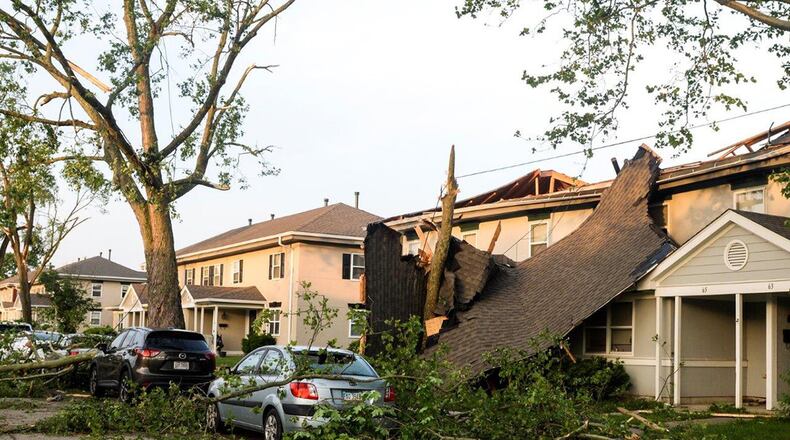Other common causes of injury included falling objects and heavy, rolling objects. Because tornadoes often damage power lines, gas lines or electrical systems, there is a risk of fire, electrocution or an explosion. Protecting yourself and your family requires promptly treating any injuries suffered during the storm and using extreme care to avoid further hazards.
Injuries
Check for injuries. Do not attempt to move seriously injured people unless they are in immediate danger of further injury. Get medical assistance immediately. If someone has stopped breathing, begin CPR if you are trained to do so.
Stop a bleeding injury by applying direct pressure to the wound. Clean out all open wounds and cuts with soap and clean water. Apply an antibiotic ointment. Contact a doctor to find out whether more treatment is needed (such as a tetanus shot).
If a wound gets red, swells, or drains, seek immediate medical attention. Have any puncture wound evaluated by a physician. If you are trapped, try to attract attention to your location.
General safety precautions
Here are some safety precautions that could help you avoid injury after a tornado:
* Continue to monitor your battery-powered radio or television for emergency information.
* Be careful when entering any structure that has been damaged.
* Wear sturdy shoes or boots, long sleeves and gloves when handling or walking on or near debris.
* Be aware of hazards from exposed nails and broken glass.
* Do not touch downed power lines or objects in contact with downed lines. Report electrical hazards to the police and the utility company.
* Use battery-powered lanterns, if possible, rather than candles to light homes without electrical power. If you use candles, make sure they are in safe holders away from curtains, paper, wood, or other flammable items. Never leave a candle burning when you are out of the room.
* Never use generators, pressure washers, grills, camp stoves or other gasoline, propane, natural gas, or charcoal-burning devices inside your home, basement, garage, or camper – or even outside near an open window, door or vent. Carbon monoxide (CO) – an odorless, colorless gas that can cause sudden illness and death if you breathe it – from these sources can build up in your home, garage or camper and poison the people and animals inside. Seek prompt medical attention if you suspect CO poisoning and are feeling dizzy, light-headed, or nauseated.
* Hang up displaced telephone receivers that may have been knocked off by the tornado but stay off the telephone except to report an emergency.
* Cooperate fully with public safety officials.
* Respond to requests for volunteer assistance by police, fire fighters, emergency management, and relief organizations but do not go into damaged areas unless assistance has been requested. Your presence could hamper relief efforts, and you could endanger yourself.
Inspecting the damage
After a tornado, be aware of possible structural, electrical or gas-leak hazards in your home. Contact your local city or county building inspectors for information on structural safety codes and standards. They may also offer suggestions on finding a qualified contractor to do work for you.
* In general, if you suspect any damage to your home, shut off electrical power, natural gas, and propane tanks to avoid fire, electrocution or explosions.
* If it is dark when you are inspecting your home, use a flashlight rather than a candle or torch to avoid the risk of fire or explosion in a damaged home.
* If you see frayed wiring or sparks, or if there is an odor of something burning, you should immediately shut off the electrical system at the main circuit breaker if you have not done so already.
* If you smell gas or suspect a leak, turn off the main gas valve and leave the house immediately. Notify the gas company, the police or fire departments, or state fire marshal’s office, and do not turn on the lights, light matches, smoke or do anything that could cause a spark. Do not return to your house until you are told it is safe to do so.
Safety during clean-up
* Wear sturdy shoes or boots, long sleeves and gloves.
* Learn proper safety procedures and operating instructions before operating any gas-powered or electric-powered saws or tools.
* Clean up spilled medicines, drugs, flammable liquids and other potentially hazardous materials.
Children’s needs
After a tornado, children may be afraid the storm will come back again and they will be injured or left alone. Children may even interpret disasters as punishment for real or imagined misdeeds. Explain that a tornado is a natural event.
* Children will be less likely to experience prolonged fear or anxiety if they know what to expect after a tornado. Here are some suggestions:
* Talk about your own experiences with severe storms or read aloud a book about tornadoes.
* Encourage your child to express feelings of fear. Listen carefully and show understanding.
- Offer reassurance. Tell your child that the situation is not permanent and provide physical reassurance through time spent together and displays of affection.
* Include your child in clean-up activities. It is comforting to children to watch the household begin to return to normal and to have a job to do.
NOTE: Symptoms of anxiety may not appear for weeks or even months after a tornado; they can affect people of any age. If anxiety disrupts daily activities for any member of your family, seek professional assistance through a school counselor, community religious organization, your physician, or a licensed professional. Counselors are listed under Mental Health Services in the yellow pages of your telephone directory.
For more information, questions, or concerns contact Wright-Patterson fire prevention inspector at 937-257-4075.
About the Author
